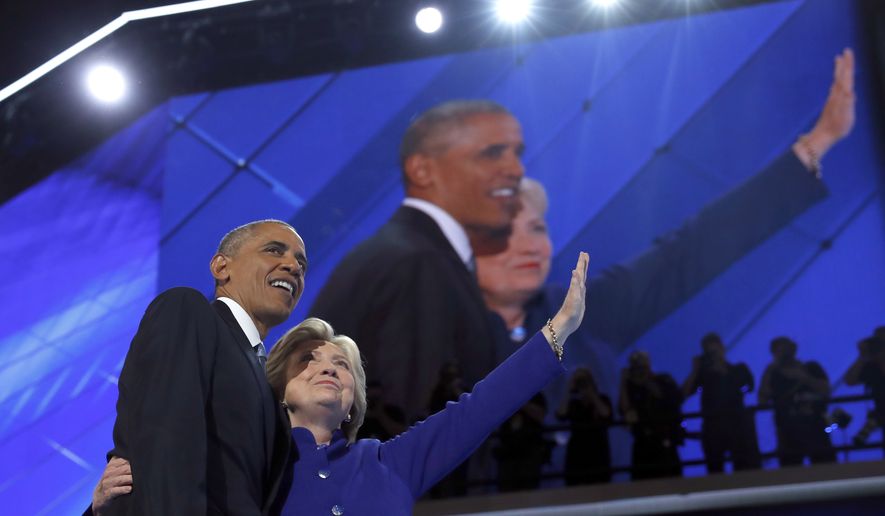Despite massive federal investment, the economy has grown an average of just 2 percent a year under President Obama — well below historical levels.
Hillary Clinton, Democrats’ nominee to succeed him, said Mr. Obama staved off a full-blown depression, but admitted this week the economy has gone “off track” over the last decade, and she’s vowed to address income inequality in a way this administration has not.
On his key domestic policy, Mrs. Clinton says Obamacare is working, but she also says it needs massive changes, including a government-run public option to rescue it from a potential death spiral.
And on foreign policy Mrs. Clinton defends her role in crafting Mr. Obama’s policy toward Syria, but says she’d go further in trying to impose a military solution, including a no-fly zone.
Those are all part of the tightrope Mrs. Clinton is walking in this campaign. Polls show voters give Mr. Obama a slight edge in approval ratings, but judge the country is going in the wrong direction — forcing Mrs. Clinton to balance her support for Mr. Obama with a vow to be the agent of change voters are looking for this year.
“There isn’t any logical way she can divorce herself from the president or his politics since … she served in his administration. Her best bet is to put as positive a spin on his legacy as she can, tweaking areas of disagreement or renewed future focus,” said Brandon Rottinghaus, a political science professor at the University of Houston who studies presidential politics. “If she splits with the White House on an issue, it needs to be a major issue where she gains political traction with the party like the Trans-Pacific Partnership. Only then does the Clinton campaign get real credit for moving policy in a new and more favorable direction.”
Indeed, TPP seems to be a clear example of Mrs. Clinton making the political calculation that breaking with her former boss was necessary.
She formerly supported the massive trade deal but reversed course amid overwhelming pressure from the progressive wing of her own party and from her primary opponent, Sen. Bernard Sanders.
But even on that, Mrs. Clinton still has looked to walk a fine line. She’s said she supports trade deals in principle but argues TPP, as currently constructed, simply doesn’t live up to her high standards.
Perhaps the most delicate area in her balancing act is the economy. On the campaign trail, Mrs. Clinton routinely praises Mr. Obama for his work in the aftermath of the 2008 economic crash, but she also must address the fact that many Americans have seen wages stagnate, and many are still unable to find work.
Her solution has been to paint the economy in very broad terms, pointing to problems that were brewing before Mr. Obama came to power and are, to some extent, beyond the ability of one president to solve.
“We have been moving off track for decades,” she said at an Ohio campaign rally this week. “It is time to get back on track.”
Mrs. Clinton has vowed to crack down on corporate America more aggressively, saying she’ll slap higher taxes on Wall Street, punish companies that move jobs overseas and reward firms for hiring more Americans. She’s also promised to increase the nation’s minimum wage to at least $12 an hour, another area where Mr. Obama has fallen short during his time in office.
Specialists say Mrs. Clinton’s job has been made easier by her Republican opponent, Donald Trump, a candidate who is promising radical change but one who is simply unpalatable to a vast majority of Democrats.
“She is not very much the change candidate, but Trump, who is the change candidate, is beating himself,” said G. Terry Madonna, director of the Center for Politics and Public Affairs at Pennsylvania’s Franklin and Marshall College. “She can just keep walking the tightrope and let him implode.”
Still, the Clinton campaign clearly believes there’s a benefit to publicly breaking with the administration in the hopes of attracting frustrated independent voters.
On the Affordable Care Act, for example, Mrs. Clinton has proposed going further than Mr. Obama, vowing to preserve the landmark reform law while also overhauling it to include a public option and other provisions.
Her husband, former President Bill Clinton, this week went as far as to say the current system is “crazy” and must be changed.
As Mrs. Clinton heads toward her next two debates with Mr. Trump, some analysts say she’d be wise to highlight differences on health care and several other issues simply to prove she won’t be a third Obama term.
“I agree with the idea of endorsing and running with Obama, but I’m surprised she doesn’t try [to find] about 5 [percent] to 15 percent of things she disagrees with him on, just to give her a little more of a margin” with moderate voters, said Ben Voth, director of debate at Southern Methodist University.
• Ben Wolfgang can be reached at bwolfgang@washingtontimes.com.




Please read our comment policy before commenting.